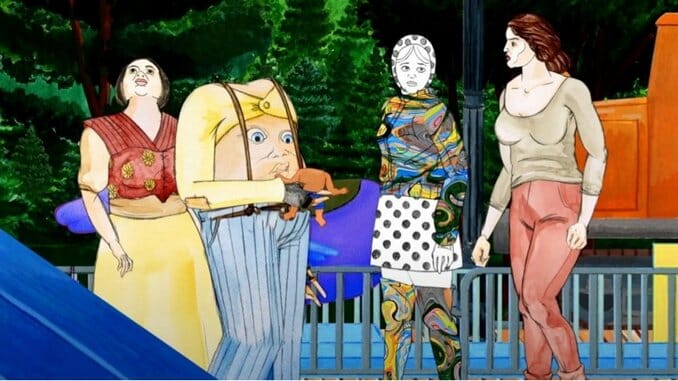Introducing Endless Mode: A New Games & Anime Site from Paste
Dash Shaw’s vibrantly animated Cryptozoo explores the oft-fantasized premise of cryptids and humans coexisting, pulling more from Jurassic Park than typical mainstream animated counterparts like Zootopia. Interested in interrogating the exploitation of fantasy and imagination for human consumption, Shaw’s psychedelic, patently adult animated feature brings daydreams into the pointedly violent and bleak reality that its genre contemporaries are privy to ignore.
The universe presented in cartoonist/writer/director Shaw’s film—animated in a style that feels like a graphic novel come to life—is our collective memory of the ’60s counterculture movement, but with one key reality-shattering amendment: Every fabled creature from human folklore walks among us, seldom seen but perpetually hunted due to their high demand on the black market. Ceasing the ill-treatment of these creatures is the life’s work of Lauren Gray (Lake Bell), who tracks down abused and injured cryptids and transports them to the Cryptozoo—a live-in amusement park in San Francisco where these beings are put on display or employed, depending on their proximity to human aptitude. While the fantastical idea of cryptids sharing the Earth with existing fauna tantalizes the imagination, the crux of Cryptozoo is bringing this charming premise into our existing hyper-capitalist society—showing just how easily our bloodthirsty system will snuff out the markedly different and extraordinary.
While Lauren firmly believes in the ethos of the Cryptozoo—which was founded by her wealthy mentor, Joan (Grace Zabriskie), who lives in the grounds’ on-site Rapunzel-esque castle—the validity of the project comes under question when a human-passing gorgon named Phoebe (Angeliki Papoulia) joins the team in its conservation efforts. Conversely, the U.S. government plans on weaponizing these creatures in combat, utilizing their varied (and often deadly) magical abilities to wipe out enemies of all kinds. Presently, the military is hunting down the Baku, a “weird pig-looking thing” of Japanese origin that devours dreams, hoping to utilize it in erasing the revolutionary dreams of young dissidents among the avant-garde: “With no dreams, there is no future.”
Cracks in Cryptozoo’s utopian M.O. begin to appear when the team agrees to take in a humanoid cryptid child named Pliny in exchange for information on finding the Baku. Touring the zoo grounds, Pliny is enchanted while Phoebe remarks that “it looks less like a sanctuary and more like a shopping mall.” It becomes clear the park doesn’t guarantee a sense of freedom or safety, instead presenting these creatures with a depressing sentiment: Sell yourselves or die. It’s an apt metaphor for the pitfalls of representation as exclusive praxis. Simply integrating marginalized communities into prevailing systems of oppression does nothing to correct how these same institutions have historically inflicted damage and trauma onto these communities, while tandemly reinforcing the cultural prevalence of viewing these communities as monoliths as opposed to communities made up of distinct individuals.
If Cryptozoo has any glaring shortcomings, it probably has to do with the insertion of fictional creatures as a visual symbol of xenophobia and intolerance, which itself can’t help but feed into narratives of dehumanization. There is also the vexing hierarchy within the cryptid world of positioning humanoids above more primal beings while also claiming that not all humanoid creatures possess verbal abilities or cognitive prowess. If this were to be a wider allegory for human intolerance across racial and ethnic divisions, it loses itself in the meddlesome intricacies of these varied life-forms.
Lauren often scrambles to justify the tepid nature of the Cryptozoo, promoting the same liberal platitudes regarding social justice and sweeping reform: “These things take time.” “This is actually pretty progressive.” “People will learn eventually.” Lauren is just one of the film’s many ’60s Bay Area countercultural caricatures—voiced by a litany of alt-comedians and indie movie actors such as Michael Cera, Jason Schwartzman and Zoe Kazan—alongside an idealistic hippie couple that, in one brutal early scene, learn a harsh lesson on imposing simplistic human attitudes on the complex natural world. The film’s critique of capitalism dovetails with its negative view of American countercultural movements, arguing that the commodification of these movements deters them from making any kind of change; the real-world parallels are evident.
Director: Dash Shaw
Writer: Dash Shaw
Stars: Lake Bell, Michael Cera, Angeliki Papouila, Zoe Kazan, Peter Stormare, Grace Zabriski, Jason Schwartzman, Louisa Krause
Release Date: January 28, 2021 (Sundance Film Festival)
Natalia Keogan is a Queens-based writer who covers film, music and culture, with particular interest in the horror genre and depictions of sexuality and gender. You can read her work in Narratively, Filmmaker Magazine and Paste, and find her on Twitter.
